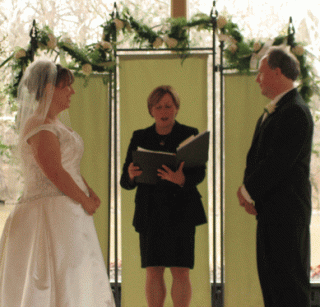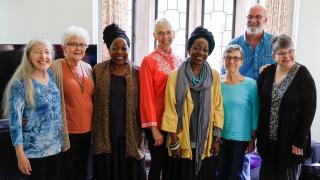Commissioned Lay Ministry
The Commissioned Lay Ministry (CLM) Program provides an opportunity for committed Unitarian Universalist leaders in the Central East and Southern regions to deepen their faith while serving their congregations in more significant ways. Initiated in the Ohio-Meadville District in the 1970s, this program has commissioned dozens of lay ministers over the years, strengthening both larger and smaller congregations in the process. Individuals who satisfactorily complete the requirements, and are approved by the Commissioned Lay Ministry Council, will be commissioned by their home congregation and be recognized as a “Commissioned Lay Minister”.
Commissioned Lay Ministry Overview
Strong lay leadership is a hallmark of the Unitarian Universalist faith tradition. The priesthood and prophethood of all believers has been a theological stance since our movement began. While many ordained ministers have been visionary leaders in our faith, we are equally supported by many talented and committed lay members. Not everyone feels the call to the ordained ministry, but the Central East Region offers an alternative path to service other than becoming a professional minister. There is currently a pilot of this program in the Southern Region.
The Commissioned Lay Ministry program is designed to help lay leaders take their ministry and service to a deeper level.
A good CLM candidate is already an active and committed lay member of a Unitarian Universalist congregation; someone who has a high level of integrity and has earned the respect of fellow congregants. They want a deeper grounding in Unitarian Universalism and want to gain more wisdom about the local and larger UU faith community. Most CLMs have particular gifts to offer and feel drawn to a particular area of ministry where they would like to expand their understanding and improve their skills. Typical areas of focus include, but are not limited to:
- worship
- pastoral care
- adult faith formation
- membership engagement
- leadership development
- leading rites of passage
- denominational affairs
The program is flexible enough to develop individualized training in many areas of ministry.
Most CLMs serve in their home congregation, but some serve in related venues (such as a partner congregation or congregational cluster) with the approval of their home commissioning congregation.
Overview of the Process
Interested aspirants should read through the materials (below) and talk to their congregation’s governing board and minister(s). If all of the parties agree that the CLM Program looks like a good fit and will serve the congregation’s mission, the aspirant can request the application materials from the CLM Council. Once received and reviewed, the Council will request an interview with you.
Those accepted into the program are considered “CLM Candidates.” They are assigned a liaison to the CLM Council to track their progress, and are also assigned an ordained minister as their mentor, who works with the candidate in developing a learning/serving plan. A typical candidate takes 2-4 years to complete the training; others have taken less time. When the mentor and the candidate both feel the candidate has completed the needed training, the candidate submits completion documents and schedules an in-person interview with the CLM Council. Upon successful completion of the interview, the candidate is issued a Commissioned Lay Minister certificate, which is good for three years, with the possibility of renewal in three year increments. CLM’s are then commissioned by their congregation in a ceremony in their home congregation. CLMs who wish to continue to serve three years after the initial commissioning time can apply for a renewal.
For more information or to discuss the program, please complete our form or contact our program administrator at cer@uua.org, who will direct you to the appropriate council member.
To find out more about the process of becoming a commissioned lay minister, please visit the procedures and forms page.

